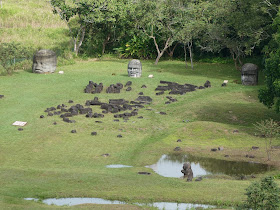We were now heading
into Olmec country. The Olmecs lived in
the south central tropical lowlands of the states of Veracruz and Tabasco from
about 1500 BC to 400 BC. There are many
questions about who they really were, especially since the colossal basalt
heads that have been unearthed have features resembling people from Africa or
the Pacific. Smaller statues and jade
artifacts have a distinct Chinese look.
It is also currently believed that the Mayan long count calendar
actually originated with the Olmecs.
All of the Olmec
sites have been discovered and pretty thoroughly excavated. These people were expert at using basalt to
create huge multi ton sculptures. 17 of
the colossal heads have been removed and put into museums for safe keeping,
leaving exact reproductions in their place.
Nevertheless, it is still nice to visit one of these sites to get a feel
for these ancient people.
After leaving the
delightful city of Puebla, our group made its way to the Olmec site of La
Venta. This was clearly a different
ecosystem than the volcanic mountains we had just left. It was mostly flat, green and wet! La Venta covers about 500 acres and is
considered to be the first planned city of monumental architecture in
Mesoamerica.
Mostly what could be seen
there first of all was a large hill
There were reproductions of the artifacts that had been found there
and were randomly placed around the property.
Below shows the area of basaltic columns
that were lying on the ground with reproductions of 3 colossal heads behind
them. We were told that the heads were
placed facing the opposite direction from how they were found, all for the
benefit of the tourists, no doubt!
As we wandered
around and also climbed up the big hill, these were my impressions.
The energy here was very old, gentle and
shamanic!!! These people were at one with the nature kingdoms, more so than at
any other site on this whole trip. No
human sacrifices were detected, and offerings were made of fruit, flowers,
smoke and incense at the sacred altars that they used. The energetic center of the site was where
the basaltic columns had fallen down. I
sensed some sort of roof on that original structure.
The top of the big
hill seemed to be the location for astronomical observations and perhaps
ceremonies for the solstice and equinox. I sensed no separation between the priesthood and the people. All in all, this place held a very soft and
harmonious energy. In the next post I
will show some of the colossal heads, carvings and artifacts that have been
removed from the various Olmec sites.








No comments:
Post a Comment